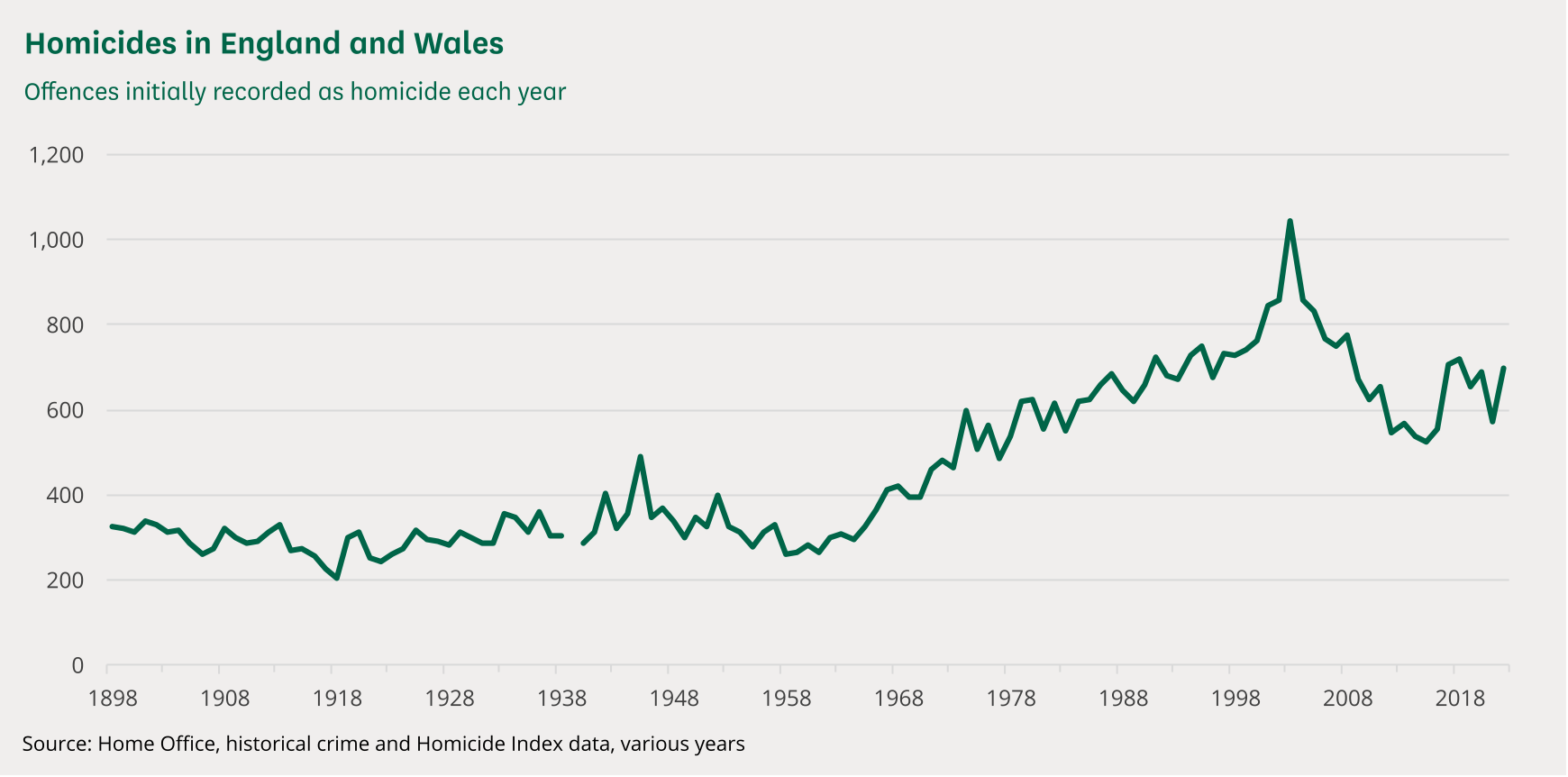
Homicide is the killing of one person by another. It accounts for a very small proportion of deaths each year in England and Wales; for the most recent five years of mortality data, from 2017 to 2021, homicides accounted for one in every 800 deaths.
Historical data on recorded homicides in England and Wales is published by the Office for National Statistics. Since records began in 1898, the number of homicides recorded has increased from around 300 a year, to over 500 a year since the 1970s. The number of offences peaked in 2003 but has since fallen.
Homicide Rates by Area
In 2022, of all countries in the UK, Northern Ireland had the highest rate of homicide at 12.6 offences per million population. The rate in England and Wales was 11.7, followed by Scotland which had 9.5 offences per million.
In the last three years, the rate of homicide in England and Wales has been highest in London, with an average of 15.1 offences per million population a year, followed by the West Midlands. Rates are lowest in the South East and South West of England.
Characteristics of the Victims of Homicide
The characteristics of the victims of homicide can vary greatly from year to year, as the overall numbers of offences is relatively low. However, there are some key patterns from the data:
- The majority of homicide victims in England and Wales are male. In the year ending March 2022, 72% of victims were male and 28% were female.
- Female victims of homicide have most commonly been killed by a partner or ex-partner, accounting for 59% of victims in the last decade where the relationship could be determined.
- Male victims of homicide have most commonly been killed by a friend or acquaintance (40% of victims where the relationship was determined).
- In the year ending March 2022, the rate of homicide was highest for Black and Black British victims and lowest for those of Mixed or multiple ethnicities.
Method of Killing
In the year ending March 2022, 41% of homicides involved a sharp instrument. This was the most common method of killing, followed by hitting or kicking (without the use of a weapon).
Sentencing and Convictions
As of May 2023, charges had been made in almost two thirds (63%) of homicide cases recorded in 2021/22. Just under a quarter (24%) of cases had not been assigned an outcome.
In the most recent year, the year to March 2022, 414 people were indicted for homicide and 318 were convicted.
How Does This All Compare to the Situation in Other Countries?
The definitions of offences vary in different countries. For example, use of the term ‘homicide’ to refer to manslaughter, murder and infanticide (as in the UK) is common in many countries, but not all.
Different social and economic conditions, as well as legal and criminal justice systems, may affect the number of homicides recorded.
Furthermore, homicides are recorded at different points in the criminal justice system depending on the country. For example, it may be recorded when the offence is discovered or on completion of legal proceedings. In some countries, the police will record a death as homicide if it cannot immediately be attributed to other causes.
The most recent comparative European data for the UK is from 2018, when the homicide rate for England and Wales ranked 18 out of 38, with 11.4 homicides per million population. Northern Ireland ranked 16 and Scotland 19.
The most recent figures are for 2020 which show that Latvia had the highest rate of homicide in Europe, with 49 offences per million population. Latvia was followed by Lithuania, Estonia, and Liechtenstein.
The lowest rate was recorded in Luxembourg (3.2 offences per million population) followed by Italy and Slovenia.
How Can We Help?
Here at Broadbents Solicitors, we ensure we keep up to date with any changes in legislation and case law so that we are always best placed to advise you properly. If you would like to discuss any aspect of your case, or are in need of criminal legal aid, please give us a call today on: Alfreton: 01773 832 511, Derby: 01332 369 090 and Heanor: 01773 769 891. Alternatively, you can fill out our online enquiry form and a member of our team will be in contact with you shortly.
Image credit: © Home Office






